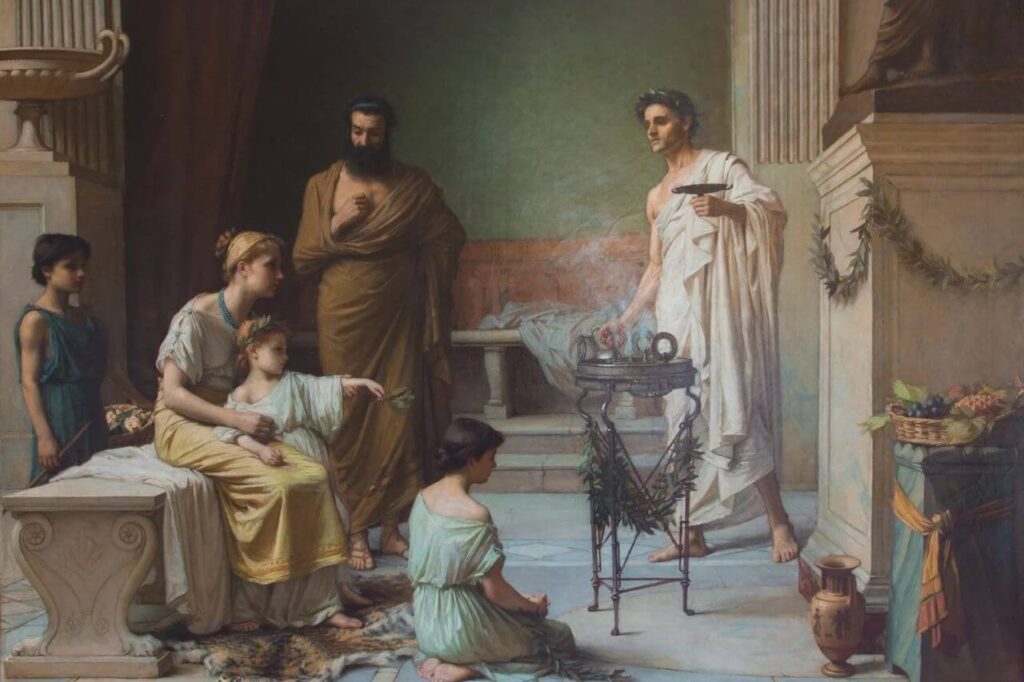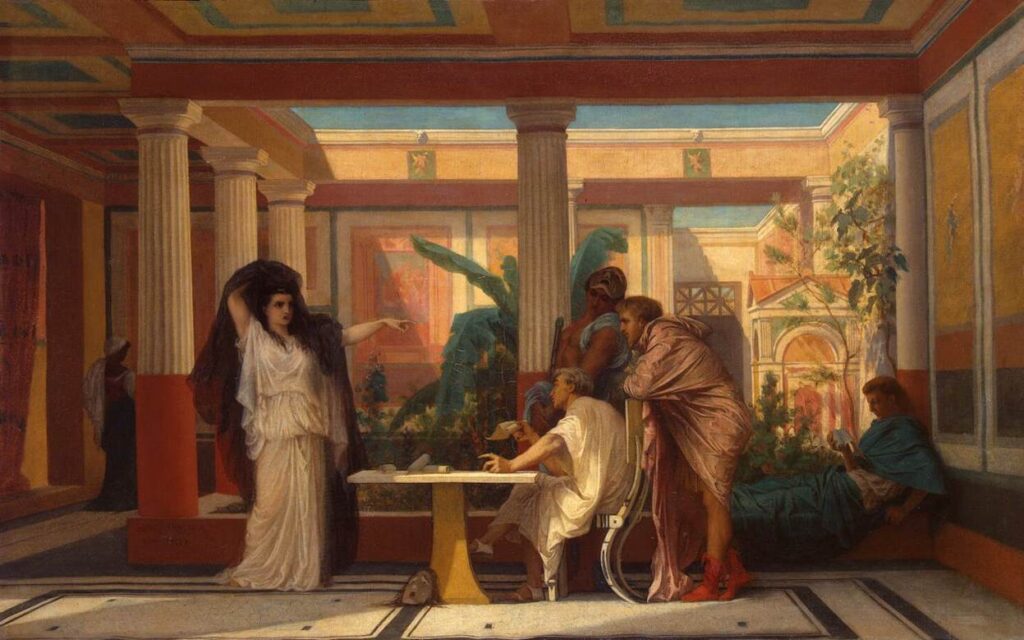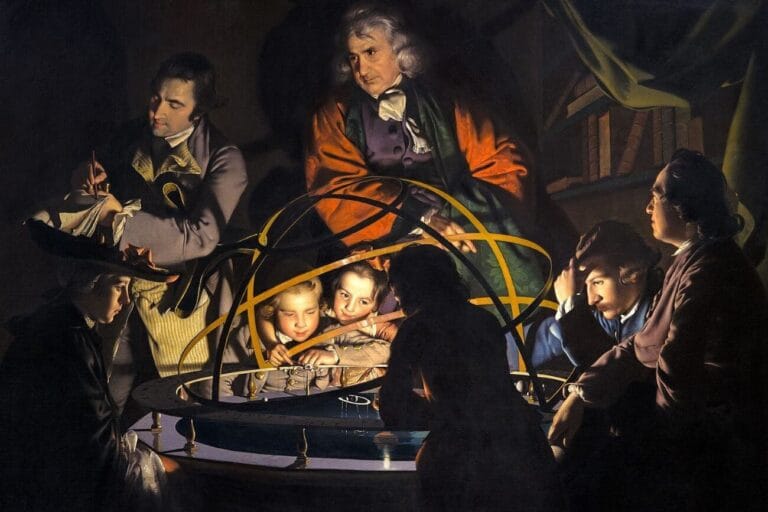Marcus Aurelius (121-180 AD) was a Roman emperor and a Stoic philosopher, today mostly known for his Meditations. Born in 121 as Marcus Annius Verus, he grew up in a well-to-do family of distinguished politicians. After losing his father at the age of three, he was brought up in the home of his paternal grandfather, who taught him ‘decency and a mild temper’ (Med. 1.1). While the grandfather was his legal custodian, his personal tutors influenced him the most, educating him in matters of literature, oratory, and philosophy – most notably Stoicism. Even after becoming the emperor of Rome in 161, he never lost his interest in philosophy and his ability to turn inward.
“Men seek retreats for themselves – in the country, by the sea, in the hills – and you yourself are particularly prone to this yearning. But all this is quite unphilosophic, when it is open to you, at any time you want, to retreat into yourself. No retreat offers someone more quiet and relaxation than that into his own mind, especially if he can dip into thoughts there which put him at immediate and complete ease: and by ease I simply mean a well-ordered life. So constantly give yourself this retreat, and renew yourself. The doctrines you will visit there should be few and fundamental, sufficient at one meeting to wash away all your pain and send you back free of resentment at what you must rejoin.”
Marcus Aurelius, Meditations 4.3.1 (trans. Martin Hammond)
The Meditations is a collection of personal writings by Marcus Aurelius, likely written during the later years of his reign. It is assumed that it was never meant to be published, for it mostly contains personal reflections, affirmations, and admonitions to remind himself of the Stoic doctrine. The work can therefore best be viewed as a collection of ‘journal entries’, in which he over and over again urges himself to put his own hardships into perspective. These entries range from fear of death to his repulsion for court life. As an emperor, Marcus Aurelius naturally had to put up with a lot of physical and mental strain, so writing the Meditations could be seen as a way of coping, of self-encouragement, and of externalizing his hardships while internalizing the Stoic doctrine.

Philosophy as Therapy
Marcus Aurelius was strongly influenced by the philosophy of Stoicism, which argued that the highest good in life is eudaimonia (‘happiness’), which one can achieve by exercising the cardinal virtues (i.e. wisdom, courage, justice, moderation) and by living in accordance with nature (i.e. according to reason, accepting man’s role within the boundaries of the laws of nature). While adopting these traits may initially seem simple, in reality it is a continuous struggle. In his writings, Marcus Aurelius repeatedly expressed his frustrations in failing to attain these virtues. It is good to know that even the emperor of Rome struggled to live and act well, that he too is simply human.
“My soul, will you ever be good, simple, individual, bare, brighter than the body that covers you? Will you ever taste the disposition to love and affection? Will you ever be complete and free of need, missing nothing, desiring nothing live or lifeless for the enjoyment of pleasure? Or time for longer enjoyment, or amenity of place, space, and climate? Or good company? No, will you not rather be satisfied with your present state and take pleasure in all that is presently yours?”
Marcus Aurelius, Meditations 10.1 (trans. Martin Hammond)
Not only does he at times fail at exercising these virtues, but he also admits lapsing into the vices of self-harm and self-neglect, as he grudgingly reminds himself (cf. Med. 5.1.3).
“Self-harm, my soul, you are doing self-harm: and you will have no more opportunity for self-respect. Life for each of us is a mere moment, and this life of yours is nearly over, while you still show yourself no honour, but let your own welfare depend on other people’s souls.”
Marcus Aurelius, Meditations 2.6 (trans. Martin Hammond)

For Marcus, these philosophical aspirations were not a leisurely pastime, but rather a practical pursuit that one needs to attend to in every moment, action, and thought, if one truly aspires to live well. Thus, he deemed philosophy as important for the soul as a doctor were for the body.
“Just as doctors always have their instruments and knives at hand for any emergency treatment, so you should have your doctrines ready for the recognition of the divine and the human, and the performance of every action, even the smallest, in consciousness of the bond which unites the two.”
Marcus Aurelius, Meditations 3.13 (Trans. Martin Hammond)
Struggle for Virtue
With these virtues, Marcus Aurelius aimed at achieving a state of calmness and acceptance of one’s fate (amor fati), which could be achieved by turning inwards and by controlling one’s judgement. Note how this idea of continual change is similar to the Buddhist notion of impermanence.
“Finally, then remember this retreat into your own little territory within yourself. Above all, no agonies, no tensions. Be your own master, and look at things as a man, as a human being, as a citizen, as a mortal creature. And here are two of the most immediately useful thoughts you will dip into. First that things cannot touch the mind: they are external and inert; anxieties can only come from your internal judgement. Second, that all these things you see will change almost as you look at them, and then will be no more. Constantly bring to mind all that you yourself have already seen changed. The universe is change: life is judgement.”
Marcus Aurelius, Meditations 4.3.4 (trans. Martin Hammond)
More specifically, Marcus aspired to achieve eudaimonia (‘happiness’) through an absence of physical pain (aponia) and mental disturbance (ataraxia), which he thought was possible by removing preconceived notions and by abstaining from habitual judgement. In the vein of Stoicism, he thought that nothing was inherently good or bad, but that thinking makes it so.
“Remove the judgement, and you have removed the thought ‘I am hurt’: remove the thought ‘I am hurt’, and the hurt itself is removed.”
Marcus Aurelius, Meditations 4.7 (trans. Martin Hammond)

One therefore always has to be attentive to what one does and thinks, for if one is not careful, his mind wanders off in thoughts burdened by the past or the future. This notion of being aware of one’s thoughts (i.e. meta-cognition) is also reminiscent of the Buddhist ideas of mindfulness.
“Do not let the panorama of your life oppress you, do not dwell on all the various troubles which may have occurred in the past or may occur in the future. Just ask yourself in each instance of the present: ‘What is there in this work which I cannot endure or support?’ You will be ashamed to make any such confession. Then remind yourself that is neither the future nor the past which weighs on you, but always the present: and the present burden reduces, if only you can isolate it and accuse your mind of weakness if it cannot hold against something thus stripped bare.”
Marcus Aurelius, Meditations 8.36 (trans. Martin Hammond)
Even though these Stoic ideals are unrealistically demanding, so much so that they seem virtually unattainable, Marcus never gave up on his aspirations of self-realization and over and over again reminded himself that that by continuous practice and awareness he could become a better man.
“When circumstances force you to some sort of distress, quickly return to yourself. Do not stay out of rhythm for longer than you must: you will master the harmony the more by constantly going back to it.”
Marcus Aurelius, Meditations 6.11 (trans. Martin Hammond)

Maxims and Aphorisms
A part of Marcus Aurelius’ appeal is the elegance of his writing. It is one of the reasons why Marcus Aurelius has recently enjoyed such a surge of interest – even though he is often misquoted or misinterpreted on the internet. While the brevity and clarity of his writing makes him appealing, the deceptively simple aphorisms often contain a lot more wisdom than meets the eye at first sight.
“Accept humbly, let go easily.”
Marcus Aurelius, Meditations 8.33 (trans. Martin Hammond)
One should remember that these writings were not intended for publication, but rather for self-encouragement. So he did not care for how others would view his writing, but merely wrote for his own benefit and without pretence. Sometimes, though, there is a certain poetry to his style, and his education in literature shines through with an occasional Homeric simile.
“So one should pass through this tiny fragment of time in tune with nature, and leave it gladly, as an olive might fall when ripe, blessing the earth which bore it and grateful to the tree which gave it growth.”
Marcus Aurelius, Meditations 4.48 (trans. Martin Hammond)
At other times, he seems weary of his philosophical contemplations, urging himself to be good rather than thinking about what it would mean to be good. It shows that he was practical in his approach to philosophy, but also that he at times had unrealistic expectations of himself.
“No more roundabout discussion of what makes a good man. Be one!”
Marcus Aurelius, Meditations 9.35 (trans. Martin Hammond)

Reflections on the Human Condition
Besides familiarising himself with the Stoics, Marcus Aurelius also turned to history and the mundanity of our daily lives to examine the human condition and, thus, himself. Sometimes this leads to extreme and disenchanting examples of reductive analysis, as in the following passage.
“How good it is, when you have roast meat or suchlike foods before you, to impress on your mind that this is the dead body of a fish, this the dead body of a bird or pig; and again, that the Falernian wine is the mere juice of grapes, and your purple-edged robe simply the hair of a sheep soaked in shell-fish blood and in sexual intercourse that it is no more than the friction of a membrane and a spurt of mucus ejected.”
Marcus Aurelius, Meditations 6.13 (trans. Martin Hammond)
At other times he turns to history, reminding himself of the ideas of continual change, of rise and fall, and of coming into being and dying, while simultaneously juxtaposing this with the notion of eternal sameness, for everything you do has inevitably been done or experienced before.
“Consider, for example, the time of Vespasian. You will see everything the same. People marrying, having children, falling ill, dying, fighting, feasting, trading, farming, flattering, pushing, suspecting, plotting, praying for the death of others, grumbling at their lot, falling in love, storing up wealth, longing for consulships and kingships. And now that life of theirs is gone, vanished. Pass on again to the time of Trajan. Again, everything the same. That life too is dead. (…) And in this context you must remember that there is proportionate value in our attention to each action – so you will not lose heart if you devote no more time than they warrant to matters of less importance.”
Marcus Aurelius, Meditations 4.32 (trans. Martin Hammond)
Meditation on death is an essential part of Stoicism, and so Marcus repeatedly reminds himself of his death and of the insignificance of his life and doings when put into perspective. It does not entail his actions do not matter, but rather that he should not worry too much about them.
“Take a view from above – look at the thousands of flocks and herds, the thousands of human ceremonies, every sort of voyage in storm or calm, the range of creation, combination, and extinction. Consider too the lives once lived by other long before you, the lives that will be lived after you, the lives lived now among foreign tribes; and how many have never even heard your name, how many will very soon forget it, how many may praise you now but quickly turn to blame. Reflect that neither memory nor fame, nor anything else at all, has any importance worth thinking of.”
Marcus Aurelius, Meditations 9.30 (trans. Martin Hammond)
Eventually we will all die, we will all be forgotten, and our struggle for the good life will seem insignificant when put into perspective. Like Michel de Montaigne’s Essays, Marcus Aurelius’ Meditations gave us a glimpse into the unchanging human condition, and it has yet defied the odds of falling into oblivion. Let us enjoy it then, before it too will be forgotten.
“Soon you will have forgotten all things: soon all things will have forgotten you.”
Marcus Aurelius, Meditations 6.21 (trans. Martin Hammond)

Further Reading
For this article, I made extensive use of Martin Hammond’s translation of Marcus Aurelius’ Meditations. I have to add as a disclaimer that I have left out some more theoretical discussions on Stoic philosophy, such as those about the Stoic notion of ‘Nature’. Besides the Meditations, I would recommend everyone to also give his Correspondence with Fronto a try, which is a personal and perhaps more touching account of Marcus Aurelius’ life and ideas.



